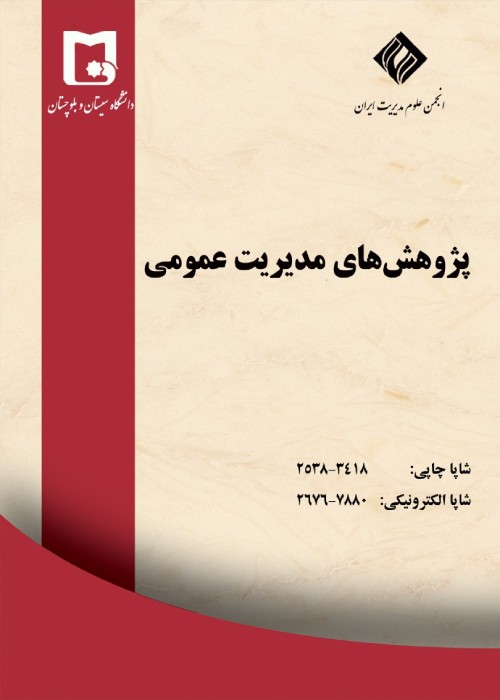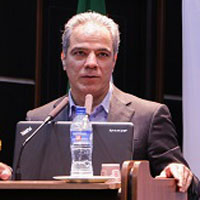Framework for Empowerment of the Ageing Experts in the Public Sector using Theme Analysis.
Author(s):
Article Type:
Research/Original Article (دارای رتبه معتبر)
Abstract:
The difficulty of job and high requirements of role and responsibility entail organizations to retain and empower ageing experts because they are valuable for business. Empowerment of the ageing experts is important to improve work efficiency and effectiveness of the elderly experts as it gives self-confidence and motivation to them to keep their jobs and create values for the organization. However, there is a limited of study in this topic and less number of scientific papers that proposed a framework for the empowerment of the ageing experts. The present study attempts to address this limitation by proposing a framework for empowering ageing experts in the public sector. The present study uses a qualitative approach, which involves in-depth semi-structured interview with ten experts for data collection. The involved experts consist of senior human resource managers and elderly experts from public sectors. The results show that the framework needs to include three main points including the factors that underpin the empowerment of ageing experts (prerequisites, capacities, and barriers), operational strategies for empowering ageing experts (structural and psychological solutions), and consequences of empowerment of ageing experts. The proposed framework would be beneficial for the human resource experts in providing important aspects to consider in empowering the ageing experts.
Introduction
Human capital is one of the most important operational resources that leads to an increase in the level of social welfare in any society. Since the efforts of each generation including expertise, experience, and effectiveness are currently the basis for the development of the next generation and provides a platform for the emergence of the phenomena of future generations, the concept of dynamism can be inferred from it. Therefore, the cycle of a dynamic process is focusing on minds of the effective role of the past generation, or, in other words, the ageing people. A number of scholars believe that as well as the extent of employment, growth, development, maturity for organizations, and especially societies, the stages of decline and reaching the end of work life must be effectively implemented (Mitsakis, 2014). In addition to the fact that ageing workforce can be transformed into organizational capital, the importance of elderly workforce to human resource management researchers is evident by looking at the relative proportions of elderly people.According to the Department of Social and Economic Affairs of the UN Secretariat, the number of people over the age of 60 in the world in 2017 is estimated at 962 million (11 % of the total world population), while in 1980 only 382 million people (8.6 % of the total world population). It is also estimated that it will increase to two billion and one hundred million people by 2050, 22% of the total world population at that time. By 2030, people over the age of 60 are expected to increase with the number of children under the age of 10 (1.41 billion vs. 1.35 billion people). Estimates show that by 2050, the number of elderly people over 60 will also be higher than adolescents and young people aged 10 to 24 (2.1 billion against 2 billion). Therefore, an idea of empowering the ageing professional workforce cannot be ignored.
In academic point of view, there are plenty numbers of study that emphasize empowerment concept. For instance, Said-Allsopp and Tallontire (2015) observed the women empowerment, Cattaneo et al. (2016) studied about the empowerment process in the organization, and Allen et al. (2016) analyzed empowerment of the workforce. However, there is a limited number of scientific papers that analyze an empowerment of the ageing professional workers. Therefore, the present study attempts to bridge this knowledge gap by proposing a framework for the empowerment of ageing workers, who are knowledgeable and skillful for the organization.
Case study
This study uses in-depth semi-structured interview that involved ten experts. A snowball sampling method is used in this study as the elderly experts in the area of empowerment of ageing workforce and their availability are not well defined. On this basis, the interview was conducted with ten experts consist of senior human resource managers and elderly experts from public sectors in Iran until the data is saturated, in which there is no newer information can be obtained from the interview. The conversation of the interviews is recorded, then transcribed for the analysis purposes.
Materials and Methods
The collected data are analyzed using a theme analysis method. This analysis involves a continuous sweep between the data set and the coding set and analyzing the data that is being generated. The information gathering tool is an in-depth semi-structured interview with ten human resource managers and elderly specialists with a minimum degree of education, senior executives and experts who have at least 48 years of experience and at least 28 years of work experience in terms of organizational competence.Data analysis and
Results
The present study uses an interview, which is simultaneously conducted and the codification process continued until the theoretical adequacy is completed and the limit of interviewing was determined by this criterion. As a result, a total of 307 key points with indicator codes have been extracted over ten interviews. As a next step, these key points are conceptualized in the form of abstract concepts. Subsequently, the basic themes and themes of the organizing research are created through explanation and communication between them. The duration of each interview was between one and two hours and it is recorded and written for analysis purposes. The first step in the process of encoding interviews is open passcode, in which the primary code is extracted from the bottom of the hint. These codes are categorized into the categories of concepts that are more general and abstract. Although the concept is closely related to each other, the more general groups are classified as subcategories, which ultimately create the main categories of the topic.The research concepts are based on 148 primary codes that refer to 307 codes by considering repetitive codes. These initial code numbers are selected to 170 concepts, which include 66 unique concepts. Similarly, each of the basic themes is itself composed of one or more concepts that those concepts actually represent the "characteristics", "conditions" or "status" of existing or desired of the subject in relation to the empowerment of the elderly. Accordingly, all 307 initial codes noted in this study referred to 104 basic subjects, with the exception of the similar cases, 21 basic research themes were obtained, which ultimately formed the six themes including pre-requisites (do's and don'ts) fields and capacities, barriers, structural solutions, psychological solutions, and consequences.
Conclusion
The findings of this study show that the factors behind the empowerment of ageing experts include three themes organizing prerequisites (fields), capacities (gaps), and barriers (not and not necessarily), in which the prerequisites affect the capacities and barriers. This means that the existing capacities and barriers can affect one another and the underlying factors for the empowerment of ageing experts eventually return to the outcome of this organizing theme. If the existing fields and capacities can overcome the barriers, they will meet the prerequisites for the empowerment of the ageing experts. This results would affect the effectiveness of empowerment process of ageing experts. However, if the weight of the barriers is higher, the empowerment process would be slow or limited. For example, the experts mentioned that there is a number of barriers that can restrain the empowerment of aging experts in the public sector comprising government policy and company regulation. Therefore, the top managers should focus on these barriers as they will slow and limit the empowerment process. Other important factors to consider in the empowerment process is strengthen financial resources and advanced training for ageing workers. In addition, the operational strategies for empowerment of ageing experts in this study are presented in two categories of hardware solutions and psychological solutions, which are combined with four routine empowerment approaches under the headings of management (leadership), psychological, applied, and structural. The weight of these strategies cannot be prioritized to one another. Their parallel and simultaneous implementation is necessary.The results of this study gives a significant contribution to academics and practices. For academics, this study will open a new field of empowerment of the professional ageing workforce, which is a knowledge gap identified in the literature review. In addition, this study proposed a conceptual framework that offers various factors to consider in empowering ageing
experts. In practices, the proposed model will give a holistic view of empowering the professional ageing workforce. The understanding these approaches, the management of an organization can effectively empower the professional ageing workforce
Keywords:
Language:
Persian
Published:
Management Researches, Volume:11 Issue: 40, 2018
Pages:
53 to 78
magiran.com/p1909730
دانلود و مطالعه متن این مقاله با یکی از روشهای زیر امکان پذیر است:
اشتراک شخصی
با عضویت و پرداخت آنلاین حق اشتراک یکساله به مبلغ 1,390,000ريال میتوانید 70 عنوان مطلب دانلود کنید!
اشتراک سازمانی
به کتابخانه دانشگاه یا محل کار خود پیشنهاد کنید تا اشتراک سازمانی این پایگاه را برای دسترسی نامحدود همه کاربران به متن مطالب تهیه نمایند!
توجه!
- حق عضویت دریافتی صرف حمایت از نشریات عضو و نگهداری، تکمیل و توسعه مگیران میشود.
- پرداخت حق اشتراک و دانلود مقالات اجازه بازنشر آن در سایر رسانههای چاپی و دیجیتال را به کاربر نمیدهد.
In order to view content subscription is required
Personal subscription
Subscribe magiran.com for 70 € euros via PayPal and download 70 articles during a year.
Organization subscription
Please contact us to subscribe your university or library for unlimited access!




